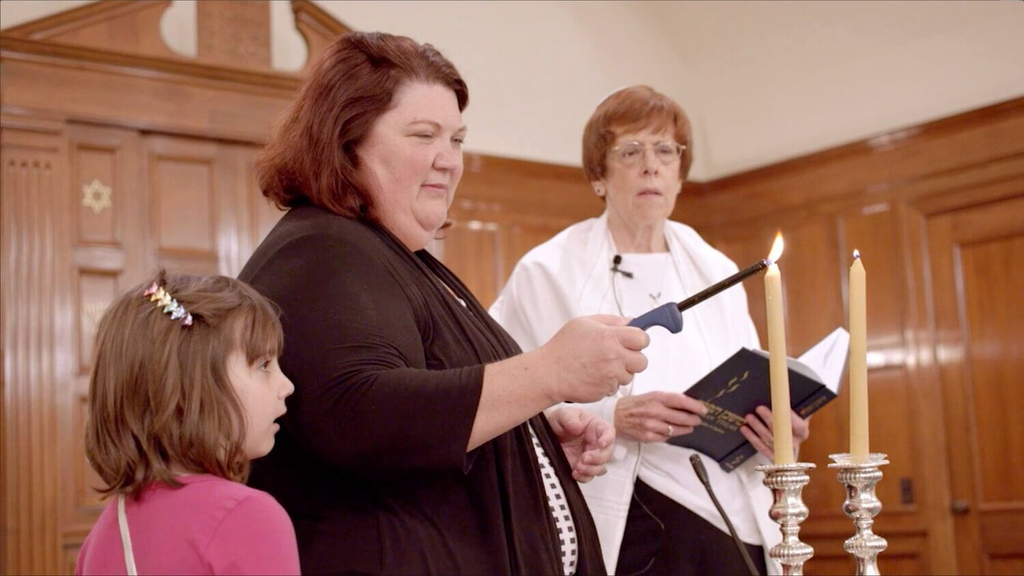Temple Emanu-El in Dothan: A Testament to Jewish Resilience in Alabama
The Dothan Tea
Archives
Temple Emanu-El in Dothan: A Testament to Jewish Resilience in Alabama
SIGN UP FOR OUR NEWSLETTER
Temple Emanu-El in Dothan: A Testament to Jewish Resilience in Alabama |
From innovative relocation initiatives to confronting modern challenges, Dothan's Jewish community exemplifies enduring faith and unity. |
Karen Arenson and her daughter, Emily, kindle the Shabbat candles at Temple Emanu-El in Dothan, Alabama, under the watchful eye of Rabbi Lynne Goldsmith, in a poignant scene from the 2016 documentary There Are Jews Here.
In 2009, the Jewish community in Dothan—a city renowned for its peanut farming and deep-rooted Christian traditions—embarked on a bold endeavor: offering up to $50,000 to Jewish families willing to relocate and join their Reform synagogue.
Alarmed by dwindling membership at Temple Emanu-El, the sole synagogue within a 100-mile radius with nearly a century of history, local hotel magnate Larry Blumberg initiated this relocation program. His vision was to rejuvenate Jewish life in the Deep South.
The initiative garnered national attention, leading to a surge in interest. The synagogue's website experienced unprecedented traffic, and media outlets highlighted the story. Applications poured in from across the country.
For Rabbi Lynne Goldsmith, who led the congregation from 2007 to 2017, the response was both uplifting and humbling. "It was a very positive thing for the Dothan Jewish community," she reflected. "It certainly opened up the eyes of people in Dothan." She recounted instances of local residents unfamiliar with Jewish practices, emphasizing the importance of education and outreach.
Her husband, Robert Goldsmith, managed the relocation program, traveling nationwide to vet potential newcomers. Ultimately, 11 families moved to Dothan under the program; however, seven have since departed.
The 2016 documentary There Are Jews Here chronicled this endeavor. Featured in the film, Lisa and Kenny Priddle relocated from New York in 2011. Despite their active participation, including leading a congregational bowling team, they grappled with feelings of isolation and eventually returned north.
Conversely, Karen and Terence Arenson moved from Los Angeles, embracing Dothan's slower pace and Southern hospitality. Their daughter, Emily, graduated from a local high school, symbolizing the family's integration into the community.
Membership at Temple Emanu-El briefly surged from about 40 to 75 families, invigorating the religious school and fostering interfaith collaborations. "We had an interfaith Thanksgiving service with seven different religions participating," Goldsmith recalled, highlighting the community's evolving diversity.
Despite these efforts, sustaining the community proved challenging. Some families left for employment opportunities or to be closer to extended family, while others found the cultural differences overwhelming.
In December 2023, Temple Emanu-El faced a harrowing challenge when it was among six Jewish congregations in Alabama targeted by bomb threats. Law enforcement swiftly responded, ensuring the safety of the community. Phillip Ensler, Executive Director of the Jewish Federation of Central Alabama, emphasized the importance of vigilance and community solidarity during such unsettling times.
Reflecting on the broader landscape, many rural American synagogues confront existential questions. Data indicates a decline in the number of synagogues since the 1990s, marking a historic shift.
Other communities have attempted similar relocation incentives with varying success. For instance, in 2022, an Orthodox synagogue in McKeesport, Pennsylvania, offered $100,000 to attract Jewish families, underscoring the challenges of sustaining Jewish life in smaller communities.
Despite these hurdles, Temple Emanu-El remains a beacon of Jewish presence in southeast Alabama. While its membership has fluctuated, the synagogue continues to serve as a spiritual home, with a new rabbi leading the congregation and welcoming Dothan's Jews every Shabbat.
As Rabbi Goldsmith aptly noted, the essence of such initiatives lies not merely in numbers but in the enduring presence and resilience of the community. |

